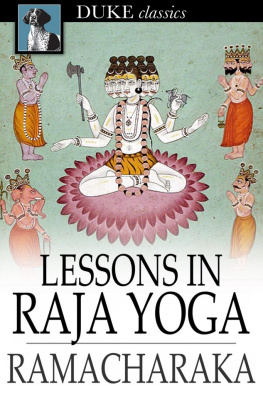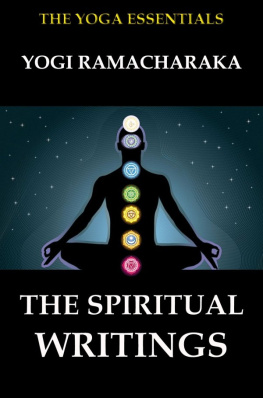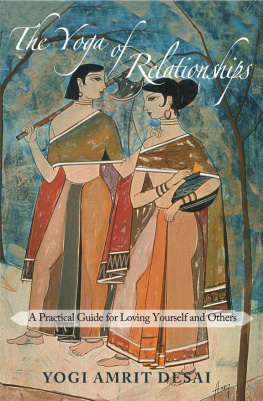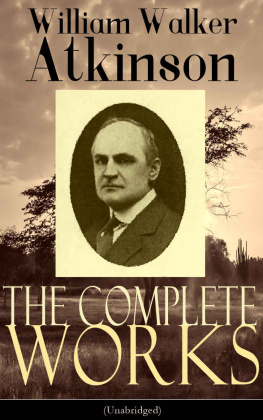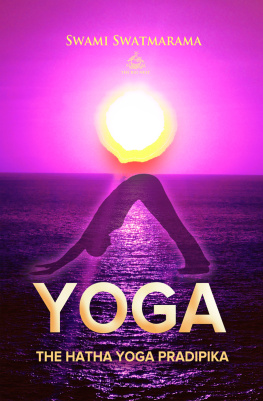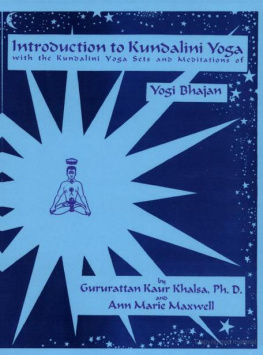Yogi Ramacharaka - Lessons in Raja Yoga
Here you can read online Yogi Ramacharaka - Lessons in Raja Yoga full text of the book (entire story) in english for free. Download pdf and epub, get meaning, cover and reviews about this ebook. publisher: Duke Classics, genre: Religion. Description of the work, (preface) as well as reviews are available. Best literature library LitArk.com created for fans of good reading and offers a wide selection of genres:
Romance novel
Science fiction
Adventure
Detective
Science
History
Home and family
Prose
Art
Politics
Computer
Non-fiction
Religion
Business
Children
Humor
Choose a favorite category and find really read worthwhile books. Enjoy immersion in the world of imagination, feel the emotions of the characters or learn something new for yourself, make an fascinating discovery.
- Book:Lessons in Raja Yoga
- Author:
- Publisher:Duke Classics
- Genre:
- Rating:3 / 5
- Favourites:Add to favourites
- Your mark:
- 60
- 1
- 2
- 3
- 4
- 5
Lessons in Raja Yoga: summary, description and annotation
We offer to read an annotation, description, summary or preface (depends on what the author of the book "Lessons in Raja Yoga" wrote himself). If you haven't found the necessary information about the book — write in the comments, we will try to find it.
Yogi Ramacharaka was the pen name of William Walker Atkinson, an American attorney, businessman, and author who was instrumental in introducing the concepts of yoga to the West in the nineteenth century. Raja yoga is the branch of the practice that addresses the nature of the mind, and imparts techniques to help better manage and control ones mind through meditation and other methods. Yoga enthusiasts and those interested in the spread of Eastern spiritual practices in the West will appreciate this detailed take on the subject.
Lessons in Raja Yoga — read online for free the complete book (whole text) full work
Below is the text of the book, divided by pages. System saving the place of the last page read, allows you to conveniently read the book "Lessons in Raja Yoga" online for free, without having to search again every time where you left off. Put a bookmark, and you can go to the page where you finished reading at any time.
Font size:
Interval:
Bookmark:

From a 1906 edition
ISBN 978-1-62011-198-7
Duke Classics
2012 Duke Classics and its licensors. All rights reserved.
While every effort has been used to ensure the accuracy and reliability of the information contained in this edition, Duke Classics does not assume liability or responsibility for any errors or omissions in this book. Duke Classics does not accept responsibility for loss suffered as a result of reliance upon the accuracy or currency of information contained in this book.
"When the soul sees itself as a Center surrounded by itscircumferencewhen the Sun knows that it is a Sun, surrounded by itswhirling planets-then is it ready for the Wisdom and Power of theMasters."
The lessons which compose this volume, originally appeared in the shapeof monthly lessons, the first of which was issued in October, 1905, andthe twelfth in September, 1906. These lessons met with a hearty andgenerous response from the public, and the present volume is issued inresponse to the demand for the lessons in a permanent and durable form.There have been no changes made in the text.
The publishers take the liberty to call the attention of the reader tothe great amount of information condensed within the space given to eachlesson. Students have told us that they have found it necessary to readand study each lesson carefully, in order to absorb the variedinformation contained within its pages. They have also stated that theyhave found it advisable to re-read the lessons several times, allowing aninterval between each reading and that at each re-reading they woulddiscover information that had escaped them during the course of theprevious study. This has been repeated to us so often that we feeljustified in mentioning it, that other readers might avail themselves ofthe same course and plan of study.
Following his usual custom, the writer of the lessons has declined towrite a preface for this book, claiming that the lessons speak forthemselves, and that those for whom they are intended will receive themessage contained within them, without any prefatory talk.
THE YOGI PUBLICATION SOCIETY.
In India, the Candidates for Initiation into the science of "Raja Yoga,"when they apply to the Yogi Masters for instruction, are given a seriesof lessons designed to enlighten them regarding the nature of the RealSelf, and to instruct them in the secret knowledge whereby they maydevelop the consciousness and realization of the real "I" within them.They are shown how they may cast aside the erroneous or imperfectknowledge regarding their real identity.
Until the Candidate masters this instruction, or at least until the truthbecomes fixed in his consciousness, further instruction is denied him,for it is held that until he has awakened to a conscious realization ofhis Actual Identity, he is not able to understand the source of hispower, and, moreover, is not able to feel within him the power of theWill, which power underlies the entire teachings of "Raja Yoga."
The Yogi Masters are hot satisfied if the Candidate forms merely a clearintellectual conception of this Actual Identity, but they insist that hemust feel the truth of the samemust become aware of the RealSelfmust enter into a consciousness in which the realization becomes apart of his everyday selfin which the realizing consciousness becomesthe prevailing idea in his mind, around which his entire thoughts andactions revolve.
To some Candidates, this realization comes like a lightning flash themoment the attention is directed toward it, while in other cases theCandidates find it necessary to follow a rigorous course of trainingbefore they acquire the realization in consciousness.
The Yogi Masters teach that there are two degrees of this awakeningconsciousness of the Real Self. The first, which they call "theConsciousness of the 'I'," is the full consciousness of real existencethat comes to the Candidate, and which causes him to know that he is areal entity having a life not depending upon the bodylife that will goon in spite of the destruction of the bodyreal life, in fact. Thesecond degree, which they call "the Consciousness of the 'I AM'," isthe consciousness of one's identity with the Universal Life, and hisrelationship to, and "in-touchness" with all life, expressed andunexpressed. These two degrees of consciousness come in time to all whoseek "The Path." To some it comes suddenly; to others it dawns gradually;to many it comes assisted by the exercises and practical work of "RajaYoga."
The first lesson of the Yogi Masters to the Candidates, leading up to thefirst degree, above mentioned, is as follows: That the SupremeIntelligence of the Universethe Absolutehas manifested the being thatwe call Manthe highest manifestation on this planet. The Absolute hasmanifested an infinitude of forms of life in the Universe, includingdistant worlds, suns, planets, etc., many of these forms being unknown tous on this planet, and being impossible of conception by the mind of theordinary man. But these lessons have nothing to do with that part of thephilosophy which deals with these myriad forms of life, for our time willbe taken up with the unfoldment in the mind of man of his true nature andpower. Before man attempts to solve the secrets of the Universe without,he should master the Universe withinthe Kingdom of the Self. When hehas accomplished this, then he may, and should, go forth to gain theouter knowledge as a Master demanding its secrets, rather than as a slavebegging for the crumbs from the table of knowledge. The first knowledgefor the Candidate is the knowledge of the Self.
Man, the highest manifestation of the Absolute, as far as this planet isconcerned, is a wonderfully organized beingalthough the average manunderstands but little of his real nature. He comprises within hisphysical, mental and spiritual make-up both the highest and the lowest,as we have shown in our previous lessons (the "Fourteen Lessons" and the"Advanced Course"). In his bones he manifests almost in the form ofmineral life, in fact, in his bones, body and blood mineral substancesactually exist. The physical life of the body resembles the life of theplant. Many of the physical desires and emotions are akin to those of thelower animals, and in the undeveloped man these desires and emotionspredominate and overpower the higher nature, which latter is scarcely inevidence. Then Man has a set of mental characteristics that are his own,and which are not possessed by the lower animals (See "FourteenLessons"). And in addition to the mental faculties common to all men, orrather, that are in evidence in a greater or lesser degree among all men,there are still higher faculties latent within Man, which when manifestedand expressed render Man more than ordinary Man. The unfoldment of theselatent faculties is possible to all who have reached the proper stage ofdevelopment, and the desire and hunger of the student for thisinstruction is caused by the pressure of these unfolding latentfaculties, crying to be born into consciousness. Then there is thatwonderful thing, the Will, which is but faintly understood by thoseignorant of the Yogi Philosophythe Power of the Egoits birthrightfrom the Absolute.
But while these mental and physical things belong to Man, they arenot the Man himself. Before the Man is able to master, control, anddirect the things belonging to himhis tools and instrumentshe mustawaken to a realization of Himself. He must be able to distinguishbetween the "I" and the "Not I." And this is the first task before theCandidate.
Font size:
Interval:
Bookmark:
Similar books «Lessons in Raja Yoga»
Look at similar books to Lessons in Raja Yoga. We have selected literature similar in name and meaning in the hope of providing readers with more options to find new, interesting, not yet read works.
Discussion, reviews of the book Lessons in Raja Yoga and just readers' own opinions. Leave your comments, write what you think about the work, its meaning or the main characters. Specify what exactly you liked and what you didn't like, and why you think so.

